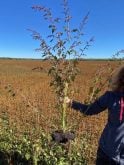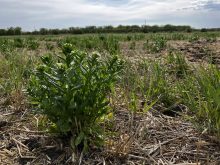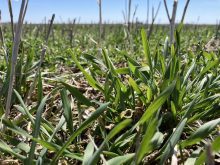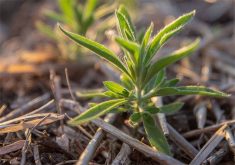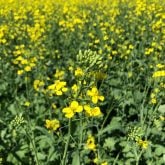It’s been said a weed is but an unloved flower, but now weeds have a garden of their own in WestMan.
That’s important because sometimes it can be hard to tell some weed species apart, and control methods can be vexingly target-specific. That makes it important to know just what you’re dealing with, and is why there’s now a spot where more than 80 of the province’s most commonly found weed species are now on display at Brandon’s Assiniboine Community College (ACC).
Read Also

Manitoba canola industry has new frontiers
Canola oil is still the main priority for the sector, but canola meal is increasingly the subject of research looking for new markets and uses for the oilseed’s byproduct.
ACC and the Manitoba Zero Till Research Association (MZTRA) officially opened a weed identification garden, located on the college’s north hill campus, next to its sustainable greenhouse, on June 29.
Both the garden and greenhouse represent a growing focus in recent years on agriculture-related programs at the college.
“The garden will provide students in multiple programs with tangible and real learning opportunities and has the potential for extension to the community,” said agribusiness instructor Danielle Tichit. “I am looking forward to having this outdoor classroom and resource to enhance the understanding and skill set of our students.”
The weed garden project began last fall, after MZTRA donated $57,000 towards its creation. The non-profit, producer-directed organization was established in 1992, and ran a research farm, north of Brandon, where it hosted demonstration activities related to zero-till practices. After many years of research, the MZTRA board of directors decided the organization had fulfilled its original mandate and discontinued its operations. The MZTRA has allocated its remaining operational fund to leave a legacy in southwestern Manitoba, through this project.

Since the donation last fall, ACC staff have worked in partnership with Manitoba Weed Supervisors Association to access weed seeds and planting stock for the garden.
Raised beds
The garden is a combination of raised beds around the outside of the site for annual weeds and in the centre of the garden there are culverts, dug down approximately six feet, to minimize root spreading.
The garden is a new resource for western Manitoba and will provide the public the ability to examine weeds in person in a variety of stages, from seedlings to mature specimens, in order to help with effective management.
“Before now the only place you could go to do weed identification was the University of Manitoba’s research station. So, for anyone from the west side of the province, it wasn’t too convenient,” Tichit said.
Having a more local option will make training for agronomists, crop scouts, farmers and other interested professionals simpler and more easily accessible.
The site is open to the public Monday to Friday, 8:30 a.m. to 4:30 p.m.
Manitoba Agriculture employees were the first group to take in the garden, brushing up their skills before launching into a province-wide weed survey.
The survey will be conducted on 650 fields throughout the province and will provide information on the abundance and distribution of weed species, including crop-specific data for wheat, barley, oats, corn, canola, flax, sunflower and soybean. As the crop mix changes and production practices like zero till have altered the weed ecosystem, the weed spectrum also changes, making regular surveys like this vital in keeping ahead of this constant yield-limiting challenge.
Manitoba Agriculture also hopes to shed new light on emerging issues such as cleavers, biennial wormwood and nightshade species.
For further information on ACC’s weed identification garden you can call, 204-725-8700 ext. 6324 or email [email protected].






![[L to R] Haley, summer horticulture technician; Tammy Johannsen, president of ACC Foundation; Danielle Tichit, ACC Agribusiness instructor; Greg Esplin, board member of MZTRA; Rick Grey, chair of ACC Agriculture and Environment; and Natasha, ACC Agribusiness student cut the ribbon for the opening of the MZTRA-ACC Weed Identification Garden.](https://static.manitobacooperator.ca/wp-content/uploads/2016/07/weed_id_garden1_acc_cmyk.jpg)

